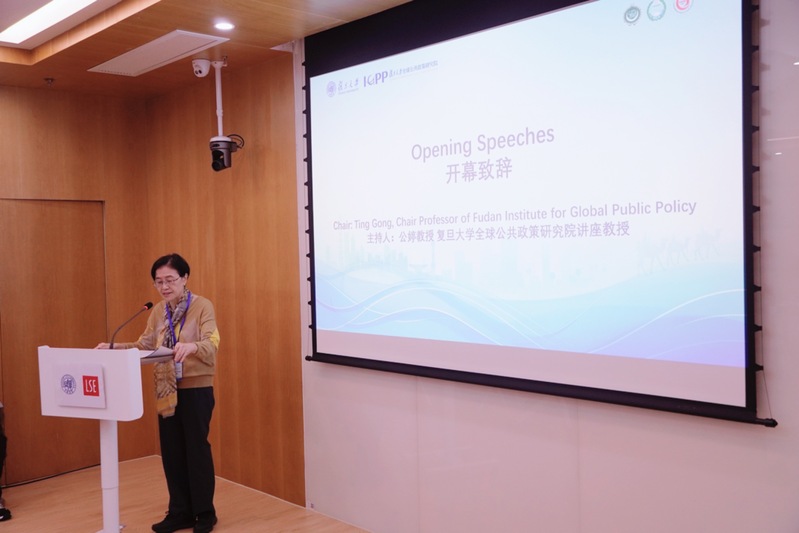Events



On October 28, 2023, the international forum on “New Frontiers of Theory and Practice in Controlling Corruption” was jointly held by the Fudan University Institute for Global Public Policy, the Hong Kong International Academy Against Corruption, and the Fudan Institute for Discipline Inspection and Supervision. It is the second sub-forum of the inaugural 2023 “China-Arab Forum on Global Development and Governance” hosted by Fudan University. Over twenty scholars from China and Arab countries participated in the forum, engaging in discussions on frontier issues related to anti-corruption theory, anti-corruption practices, and anti-corruption cooperation. The conference was chaired by Gong Ting, Chair Professor from the Fudan University Institute for Global Public Policy.
At the beginning, Professor Gong Ting delivered the opening remarks, welcoming the guests to participate in the sub-forum discussions. Mr Jin Haiyan, Deputy Secretary of the Party Committee, Secretary of the Commission for Discipline Inspection, Dean of the Institute for Discipline Inspection and Supervision, Fudan University; Professor Ghada Farouk Hassan, Acting President of Ain Shams University; Professor Nahed Emaish, Vice-President of the University of Jordan; and Lau Chi-ho, Director of Academy Office, Independent Commission Against Corruption, Hong Kong, respectively delivered distinguished guest speeches.

Secretary Jin Haiyan pointed out that the construction of clean governance is of great significance to social development. It is not only a pursuit of values but also the foundation of global governance. Professor Ghada Farouk Hassan emphasized the importance of discussing global anti-corruption issues and the role of higher education in raising awareness among the public to prevent corruption. Professor Nahed Emaish stressed that combating corruption has always been a priority in Jordan, and the University of Jordan plays an important role in this effort. Director Liu Zhihao called for not overlooking the issue of corruption when discussing global development and governance. He stressed that anti-corruption efforts should not be pursued in isolation and that countries should unite and form alliances to address this issue collectively.
After the distinguished remarks, the attendees took a group photo, followed by the keynote speeches and presentations.

Director Lau Chi-ho delivered the keynote speech Advancing Anti-corruption Cause Through International Cooperation. He emphasized the need to strengthen anti-corruption training at the international, local, and internal levels, and to establish academic research platforms to facilitate extensive exchanges among professionals worldwide. Watt Wai-yeung, Chief Academy Officer of the Independent Commission Against Corruption, gave a presentation titled The Hong Kong Model - Establishing an Effective Anti-Corruption Institution. Using Hong Kong as a case, he highlighted that the fight against corruption is a long-term endeavor that requires comprehensive approaches. Liu Zhigang, Executive Dean of the Institute for Discipline Inspection and Supervision, Fudan University, spoke on the topic of The Connection between Supervisory Supervision and Procuratorial Supervision, elaborating on the motivations and basic principles of China's supervision system reform. Ricardo Gomes, Adjunct professor of Getulio Vargas Foundation, engaged in discussions with the participants through a presentation titled Tender, Contract and Notice Analyzer.
Afterwards, Zhang Jing, Assistant Professor from the Institute for Integrity, Southern University of Science and Technology, gave a presentation titled Corruption Perceptions Indexes: Analysis and Reconfiguration. Wu Haihong, Professor from the Shanghai Party Institute of CPC & Shanghai Administration Institute, delivered a presentation titled Sample Analysis of Corruption Characteristics of Post-90s Cadres. Yang Litianqing, Assistant Professor from the School of Government, Sun Yat-sen University, presented How to Supervise the Discipline Inspection Power? Characteristics and Effects. Tu Wenyan, Assistant Professor from the Institute for Global Public Policy, Fudan University, presented Does Anti-Corruption Campaign Trigger Bureaucratic Slack? The Role of Public Management Reform.
Li Hui, Professor from the School of International Relations & Public Affairs, Fudan University, provided comments and feedback on the presentations. The participants actively engaged in discussions. The Sub-Forum on “New Frontiers of Theory and Practice in Controlling Corruption” concluded successfully amidst applause.